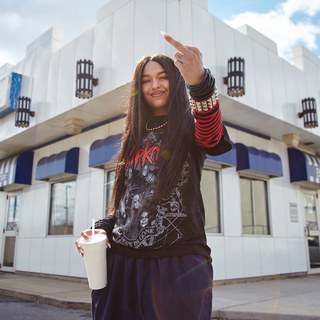princess nokia, a girl cried rED
The latest mixtape from Destiny Frasqueri pulls from her love of emo and alt-rock. It’s an underdeveloped but strangely addictive left-turn.
Rough Trade
“Everybody wants to put on this façade that they all have it together,” Princess Nokia told fans during an Instagram Live chat this past January. “And I wanted to write a mixtape that was about falling apart and being a fucking mess.”
Enter A Girl Cried Red, an inchoate but strangely addictive 21 minutes of pure and messy emotions from the shape-shifting New York City rapper born Destiny Frasqueri. Having already covered lo-fi house, trip-hop, disco-soul, Erykah-meets-Lana-Americana, boom-bap-meets-trap, and many points in-between, Princess Nokia has now leaned into the formative sounds of her middle-school years to make an emo mixtape that doesn’t sound like emo or rap or even emo-rap. Rather, it’s as if pop-punk and cloud-rap got caught in a flash flood of melancholy and were forced to share an umbrella.
In the hands of another artist, A Girl Cried Red might seem like a gimmick, but Princess Nokia’s strongest currency has always been her realness—she’s the kind of performer who’d hop offstage to slap a heckler, the kind of straphanger who wouldn’t think twice about tossing soup at a subway racist, the kind of granddaughter who’d step upstairs to the roof for a smoke break and Instagram Live chat with her fans so as not to bother her Puerto Rican grandfather taking refuge in her apartment post-hurricane. So when she says that rock is her favorite genre, which she often has, you believe her.
She’s traded her signature stream-of-consciousness flow and honeyed-soul vocal stylings for a Midwestern monotone. It’s not a seamless transition: “Flowers and Rope” has the brevity of a punk song, leaving its ends frayed and waving into the next track rather than resolved and resonating from an explosion of angsty screams and cymbal crashes. Something’s missing, but maybe intentionally so—it’s a song about emptiness after all, and this is communicated effectively, both lyrically and aesthetically.
“Your Eyes Are Bleeding” is a bit more realized, awash in textures and sentiments of heartache and loneliness that bore into the brain like an earworm that’s all mood. “Look Up Kid” and “Little Angel” find Princess Nokia drawing from her own troubled past to connect with young fans that might be hurting in new but familiar ways with a message of hope and understanding. Both tracks make effective use of warm guitar tones melting in and out of icy beats.
A trio of less rock-driven songs feels more self-reflective, touching on how Frasqueri’s life has changed since last year’s reissue of her 2016 breakout mixtape 1992. The tidy production leaves room for her to lay bare the most tangled aspects of the “fucking mess” she finds herself in these days. In a way, they serve as a solid argument that money buys sadness: The heavily Auto-Tuned “For the Night” contains the mix’s most candid (and satisfyingly shout-along-able) line—“I make money to replace you/Used to love you, now I hate you.” The appropriately titled “Morphine” is the biggest downer, full of concrete cries for help like, “I’m an emo little boy and I want someone to hold me/Got my money like a blanket and I hold it when I’m lonely.” The glitchy “At the Top” finds the songwriter at her most self-assured but still on message—it’s lonely up there after all.
Considering the wide left turn this mixtape is taking—her fourth in a series of eclectic swerves from 2014’s Metallic Butterfly to 2015’s Honeysuckle to 2016’s 1992—it feels as if Princess Nokia is still in an experimental stage, hasn’t found her authentic voice. Perhaps “change” is her voice as much as it is punk, evidenced by an unwavering “girls to the front” ethos, bruja feminism, and independent spirit—not to mention the middle finger salute with a smile she’s serving on the cover of A Girl Cried Red.
Taken together with her other albums, it’s a part of a motley crew of modes that is shaping Princess Nokia into a great experimentalist. On its own, it lacks the completeness of a coherent project of genre hybridization, and lacks a standout single on the level of, say, “Tomboy” or “Kitana.” But, then again, it’s inevitable that an emo-inspired mixtape would have fewer bops than one inspired by classic NYC hip-hop. And the enthusiasm with which she revisits the music that made her is contagious.
